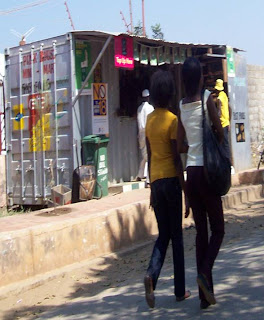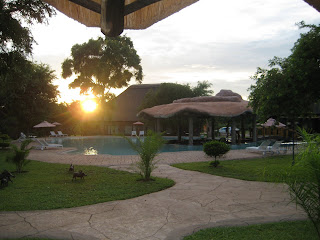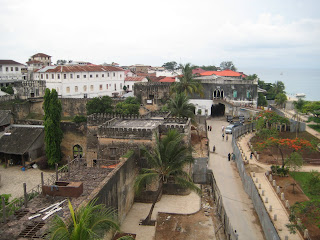
It certainly didn't feel like Christmas this year, what with the lack of commercialism and no decorated houses challenging the bright lights of Las Vegas. Instead, it has been a quiet week, punctuated with Christmas dinner at my manager's house. it was a very nice time, with her neighbors and another PSI colleague and her two small daughters attending. The girls certainly livened things up with their boundless energy. Kate had warned me that both she and her husband are vegetarians, so Tofurkey would be on the menu. However, there were no Tofurkeys to be found in Nairobi, so dinner consisted of many delicious vegetable dishes. It was hardly a disappointment as everyone knows that it's all about the side dishes anyway.
After a relaxing dinner, we played Perudo, a dice game. When Kate and Paul first told me about this, I was convinced that they had made it up, and worse yet, changed the rules as they went along. Indeed, at first it did seem like that, but after a couple of rounds (both of which I lost), I started to get the hang of it. The challenge of the game is to lie about what the face-value of your dice are, and guess what the other players are holding, based on probability. The problem is that the more you drink, the easier the lying gets, but the harder the calculations become. It was a lot of fun, but the rules were so complicated, I'd never be able to teach anyone else.
Friday was Boxing Day, also a national holiday. Most businesses were closed (although I was surprised that the grocery store was open on Christmas Day), but one of the local shopping areas was open, so I spent the afternoon there. A number of shops were closed, but the outdoor food court was open, as was the Friday Masai Market. Since my first experience at the market back in September left something to be desired, I decided to give it another try. Although the vendors weren't quite as aggressive as I had remembered them (and nowhere near as aggressive as those in Zanzibar), it still really turned me off. Now that I've seen what wares are typically Kenyan and have learned what prices are reasonable, there are items that I do want to buy before I leave, but I wish I could just say, "If you leave me alone, I'm much more likely to buy from you." That attitude just doesn't fly, though. I once again left without buying anything, but will have to give it one more try before I leave.
As a follow-up to last week's post about reviewing resumes, I conducted interviews with potential candidates on Tuesday and Wednesday. I was stunned that Susan, the Office Manager, was able to arrange for 8 prospects to come in on one-day's notice, one even flying in from another province. I was impressed by the professionalism shown by each candidate (all women), however some of their qualifications left a lot to be desired. Susan, another colleague and I met with each person and asked typical interview questions, as well as presented some actual scenarios to gauge their problem-solving abilities. The women who impressed me the most where the ones who confidently answered the question about where they wanted to be in five years. These women had clear visions of their future, and were already working on executing that plan. After the official interview, Susan gave them a written test with a series of real-life situations to solve in 60 minutes. These weren't terribly complicated problems, but showed whether the candidate could read an airline itinerary correctly, knew the steps needed to plan a meeting with international guests and could calculate per diems. We finished the interviews with two contenders - one who was extremely well qualified, but perhaps overly so, and another who had a solid basic skill set, but will need a bit of mentoring. The hiring process is very swift, so someone will be offered the position during the first week of January.
I'm off to Tsavo West National Park tomorrow for one last safari and to ring in the New Year with lions and elephants. Happy New Year!








 While the hotel staff was setting up the extra bed and figuring out how to rig up a mosquito net across the room, we decided to go for a walk and explore Stone Town. Unfortunately, it was raining very hard, leaving inches and inches of water (and trash and godknowswhatelse streaming down the street.) When the rain finally subsided, the city looked as though it might be interesting. As we walked down one of the larger streets, we were bombarded with vendors selling everything from CDs to bags of cashews. “Jambo Jambo mama. Welcome. Welcome. You will buy a CD,” was the constant cry.
While the hotel staff was setting up the extra bed and figuring out how to rig up a mosquito net across the room, we decided to go for a walk and explore Stone Town. Unfortunately, it was raining very hard, leaving inches and inches of water (and trash and godknowswhatelse streaming down the street.) When the rain finally subsided, the city looked as though it might be interesting. As we walked down one of the larger streets, we were bombarded with vendors selling everything from CDs to bags of cashews. “Jambo Jambo mama. Welcome. Welcome. You will buy a CD,” was the constant cry.  We stuck to the main road for a bit, then veered off to the Old Fort, a post-Portuguese occupation structure. Behind the fort is an amphitheater with merchant stalls lining the perimeter and an outdoor café. After a rest and a cold drink, we continued walking around and had our first experience with the shop owners with their relentless, aggressive sales pitches. Some even grab your arm and try to pull you into their store. I can’t imagine why they think that it is an effective sales technique, but apparently, it appeals to someone, just not us. There were paintings, woodcarvings and other crafts for sale, but very little that was different from what is available in Kenya.
We stuck to the main road for a bit, then veered off to the Old Fort, a post-Portuguese occupation structure. Behind the fort is an amphitheater with merchant stalls lining the perimeter and an outdoor café. After a rest and a cold drink, we continued walking around and had our first experience with the shop owners with their relentless, aggressive sales pitches. Some even grab your arm and try to pull you into their store. I can’t imagine why they think that it is an effective sales technique, but apparently, it appeals to someone, just not us. There were paintings, woodcarvings and other crafts for sale, but very little that was different from what is available in Kenya. 
 We continued walking to tour company for which we had a recommendation and sign up for a spice tour the next day. It was a bit of a hike, but we finally found the office, after being followed and harangued by men offering to take us there (for a fee, naturally.) The tour was to last most of the day starting with a tour of a spice plantation, then on to a beach for an hour, the slave cells and then back to Stone Town. We didn’t give it much thought and figured it was a good thing to do. We then zigzagged our way through the alleys, believing that following Muslim women through the passageways would provide a safer passage.
We continued walking to tour company for which we had a recommendation and sign up for a spice tour the next day. It was a bit of a hike, but we finally found the office, after being followed and harangued by men offering to take us there (for a fee, naturally.) The tour was to last most of the day starting with a tour of a spice plantation, then on to a beach for an hour, the slave cells and then back to Stone Town. We didn’t give it much thought and figured it was a good thing to do. We then zigzagged our way through the alleys, believing that following Muslim women through the passageways would provide a safer passage.





